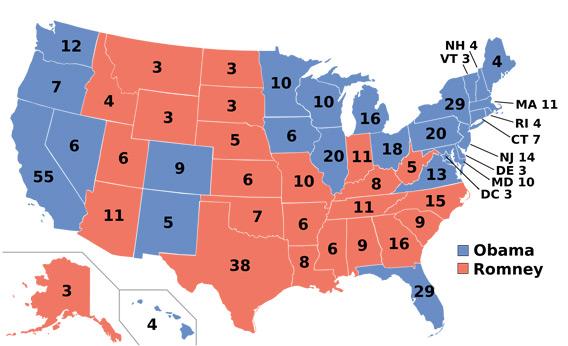In Defense of the Electoral College
 Electoral college map for the 2012 United States presidential election
Electoral college map for the 2012 United States presidential election Photograph courtesy Gage/Wikimedia Commons.
The Electoral College is widely regarded as an anachronism, a nondemocratic method of selecting a president that ought to be superseded by declaring the candidate who receives the most popular votes the winner. The advocates of this position are correct in arguing that the Electoral College method is not democratic in a modern sense. The Constitution provides that ?Each State shall appoint, in such Manner as the Legislature thereof may direct, a Number of Electors, equal to the whole Number of Senators and Representatives to which the State may be entitled in the Congress.? And it is the electors who elect the president, not the people. When you vote for a presidential candidate you?re actually voting for a slate of electors.
But each party selects a slate of electors trusted to vote for the party?s nominee (and that trust is rarely betrayed). Because virtually all states award all their electoral votes to the winner of the popular vote in the state, and because the Electoral College weights the less populous states more heavily along the lines of the Senate (two Senators and two Electoral College votes for every state, and then more electoral votes added for each state based on population), it is entirely possible that the winner of the electoral vote will not win the national popular vote. Yet that has happened very rarely. It happened in 2000, when Gore had more popular votes than Bush yet fewer electoral votes, but that was the first time since 1888.
There are five reasons for retaining the Electoral College despite its lack of democratic pedigree; all are practical reasons, not liberal or conservative reasons.
A dispute over the outcome of an Electoral College vote is possible?it happened in 2000?but it?s less likely than a dispute over the popular vote. The reason is that the winning candidate?s share of the Electoral College invariably exceeds his share of the popular vote. In last week?s election, for example, Obama received 61.7 percent of the electoral vote compared to only 51.3 percent of the popular votes cast for him and Romney. (I ignore the scattering of votes not counted for either candidate.) Because almost all states award electoral votes on a winner-take-all basis, even a very slight plurality in a state creates a landslide electoral-vote victory in that state. A tie in the nationwide electoral vote is possible because the total number of votes?538?is an even number, but it is highly unlikely; it has not occurred since 1824.
Of course a tie in the number of popular votes in a national election in which tens of millions of votes are cast is even more unlikely. But if the difference in the popular vote is small, then if the winner of the popular vote were deemed the winner of the presidential election, the losing candidate would have an incentive to seek a recount in the states in which he?d lost by only a small margin. So, for that matter, would the winner in states that he had lost or that he had won by only a small margin in order to shore up his overall vote total. The lawyers would go to work in state after state to have the votes recounted, and the result would be debilitating uncertainty, delay, and conflict?look at the turmoil that a dispute limited to one state, Florida, engendered in 2000.
2) Everyone?s President
The Electoral College requires a presidential candidate to have transregional appeal. No region (South, Northeast, etc.) has enough electoral votes to elect a president. So a solid regional favorite, such as Romney was in the South, has no incentive to campaign heavily in those states, for he gains no electoral votes by increasing his plurality in states that he knows he will win. This is a desirable result because a candidate with only regional appeal is unlikely to be a successful president. The residents of the other regions are likely to feel disfranchised?to feel that their votes do not count, that the new president will have no regard for their interests, that he really isn?t their president.
Source: http://feeds.slate.com/click.phdo?i=0ac7f4e373331c10d0fbeabb7a9e2738
roman holiday belize adele lyrics best new artist 2012 grammys foo fighters nikki minaj

0টি মন্তব্য:
একটি মন্তব্য পোস্ট করুন
এতে সদস্যতা মন্তব্যগুলি পোস্ট করুন [Atom]
<< হোম